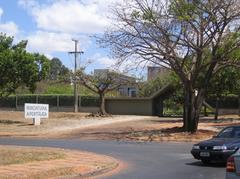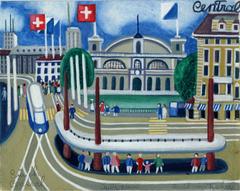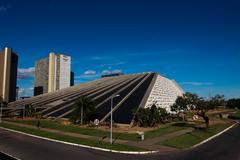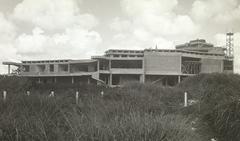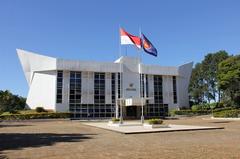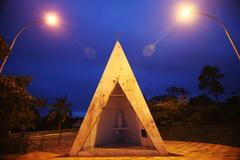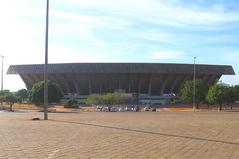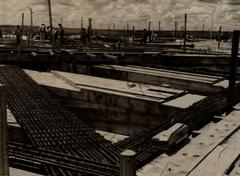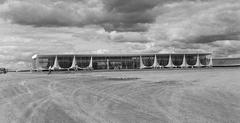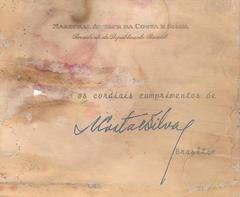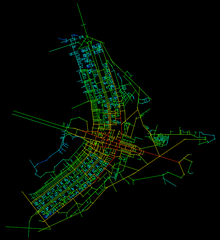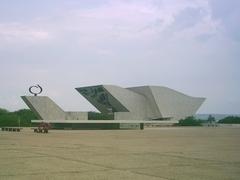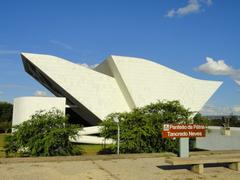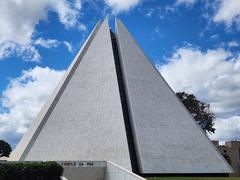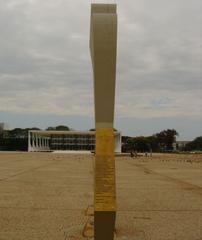
Federal Public Defender’s Office Brasília: Visiting Hours, Tickets, and Historical Sites Guide
Date: 04/07/2025
Introduction
The Federal Public Defender’s Office (Defensoria Pública da União, DPU) in Brasília is a cornerstone of Brazil’s justice system, embodying the nation’s constitutional guarantee of free legal aid for those unable to afford private counsel. Located in the heart of the capital, the DPU not only serves as a crucial institution for legal assistance but also stands as a testament to Brazil’s commitment to justice, equality, and human rights. Its headquarters, situated among iconic modernist structures, offers visitors a unique opportunity to explore both Brazil’s legal landscape and its architectural heritage. This comprehensive guide provides detailed information on the DPU’s history, cultural significance, visiting hours, accessibility, and tips for making the most of your visit.
For the latest updates, guided tour availability, and visitor requirements, consult the official Federal Public Defender’s Office website, as well as trusted travel resources such as Audiala and The Guide to Brasília’s Tourist Spots.
Table of Contents
- Introduction
- Historical Evolution of Public Defense in Brazil
- The Federal Public Defender’s Office: Origins and Mandate
- Legal Significance and Human Rights Advocacy
- The Role of Brasília and Architectural Highlights
- Key Milestones and Achievements
- Planning Your Visit: Hours, Tours, Accessibility, and Entry
- Visitor Tips and Nearby Attractions
- Cultural and Social Impact
- Comparative Perspective: Global Public Defense
- Ongoing Challenges and Reforms
- FAQ
- Conclusion
- References
Historical Evolution of Public Defense in Brazil
Context and the Move to Brasília
Brazil’s public defense tradition is deeply rooted in its broader legal and political history. The relocation of the capital to Brasília in 1960 was a strategic move aimed at national integration and modernization (About Brasília’s History). This shift consolidated federal institutions, paving the way for the establishment of the DPU, which would become instrumental in ensuring access to justice for all Brazilians.
Origins and Mandate of the DPU
The DPU was created to provide free legal representation in federal matters to those unable to afford counsel. Its mandate, enshrined in Article 5, LXXIV of the 1988 Constitution, is to guarantee full and free legal assistance to those with insufficient resources. The DPU’s responsibilities encompass criminal defense, civil cases involving federal law, and advocacy for marginalized populations, including indigenous peoples, migrants, refugees, and the economically disadvantaged.
Legal Significance and Human Rights Advocacy
The DPU is a symbol of Brazil’s commitment to human rights and equal access to justice. It not only defends individual clients but also engages in strategic litigation, challenges unconstitutional laws, and promotes policies protecting vulnerable groups. Its participation in landmark cases before the Supreme Federal Court underscores its influence on national legal discourse and social justice reforms.
The Role of Brasília and Architectural Highlights
Brasília’s design as the federal capital was guided by the principles of modernism, with a focus on openness, symmetry, and civic symbolism. The DPU headquarters is located within the Ministries Esplanade (Esplanada dos Ministérios), flanked by other major government institutions such as the Supreme Federal Court and National Congress. The building itself reflects Brasília’s architectural ethos, featuring clean lines, open spaces, and accessible facilities (Happy Frog Travels: Architecture of Brasília).
The DPU’s proximity to key landmarks allows visitors to experience a cohesive tour of Brazil’s legal and political heart, further enriched by the city’s unique urban planning and aesthetic.
Key Milestones and Achievements
Since its founding, the DPU has:
- Expanded its presence to every Brazilian state.
- Advocated successfully in landmark Supreme Court cases involving prison conditions, indigenous rights, and social security.
- Championed the rights of marginalized communities, including prisoners, refugees, and victims of human trafficking.
- Launched educational outreach programs to inform citizens of their legal rights and services.
Planning Your Visit: Hours, Tours, Accessibility, and Entry
Visiting Hours
- Typical Hours: Monday–Friday, 8:00 AM to 6:00 PM (some areas may open from 9:00 AM; always check the official website for current hours).
- Closed: Weekends and federal holidays.
Entry and Tickets
- Admission: Free of charge. No tickets required for general visits.
- Appointments: Recommended for legal consultations, group visits, or guided tours.
Tours and Educational Programs
- Guided Tours: Offered occasionally, especially for student groups and delegations. Advance booking is required.
- Educational Events: The DPU periodically hosts seminars, workshops, and public lectures; check the official website for event details.
Accessibility
- Facilities: Wheelchair ramps, elevators, and accessible restrooms are available.
- Special Assistance: Visitors with disabilities should contact the office in advance to arrange accommodations.
Visitor Tips and Nearby Attractions
Location and Transportation
- Address: SHS Quadra 6, Complexo Brasil 21, Bloco A, Brasília - DF, 70316-000, Brazil
- Metro: Closest station is Galeria (approx. 1.5 km away).
- Bus: Multiple lines serve the Ministries Esplanade.
- Taxi/Ride-Sharing: Uber and taxis are widely used and convenient.
Security and Conduct
- ID Required: Government-issued photo ID (passport for foreigners).
- Security Screening: Bag checks and metal detectors are standard.
- Dress Code: Business or smart casual is preferred.
- Photography: Allowed in public areas; restricted in legal offices—always check with staff.
Language Support
- Primary Language: Portuguese. Some staff speak English or Spanish; request translation in advance if needed.
Nearby Attractions
- Within Walking Distance: Supreme Federal Court, National Congress, Cathedral of Brasília, National Museum, and more (The Guide to Brasília’s Tourist Spots).
- Food & Amenities: Cafés and restaurants in the Brasil 21 complex; restrooms and Wi-Fi available.
Seasonal Tips
- Weather: Best visiting months are May–July (dry season); bring sunscreen and water (Wikivoyage: Brasília).
- Safety: Central Brasília is generally safe, but standard precautions apply.
Cultural and Social Impact
The DPU is integral to Brasília’s civic identity, reflecting the city’s founding ideals of equality, justice, and inclusion. Its work extends beyond the courtroom—through education, advocacy, and public engagement, the DPU helps foster a culture of rights awareness and participatory citizenship.
Comparative Perspective: Global Public Defense
Brazil’s public defense model, grounded in constitutional law and expanded through active policy advocacy, is unique among global counterparts. Unlike some countries where public defense is limited to criminal cases, the DPU’s mandate encompasses a broad range of civil and social rights, making it a global reference point for integrated legal aid systems (Learn more about Public Defense History).
Ongoing Challenges and Reforms
Challenges for the DPU include:
- Resource limitations and high demand.
- Geographic disparities in service access.
- Maintaining institutional independence.
Reforms are ongoing to expand funding, staff, and outreach, ensuring equitable legal support for Brazil’s diverse population.
Frequently Asked Questions (FAQ)
Q: What are the visiting hours for the DPU in Brasília?
A: Monday–Friday, generally 8:00 AM–6:00 PM. Confirm on the official website.
Q: Is there an entry fee or do I need tickets?
A: No, entry is free and no tickets are required.
Q: Are guided tours available?
A: Occasionally, for educational groups and by prior arrangement.
Q: Is the building accessible for people with disabilities?
A: Yes, with ramps, elevators, and accessible restrooms.
Q: Can I take photographs?
A: Allowed in public areas; restricted in legal offices—ask staff for permission.
Q: How can I get there?
A: By metro (Galeria station), bus, taxi, or ride-sharing. Parking is available at Brasil 21, but public transport is recommended.
Conclusion
A visit to the Federal Public Defender’s Office in Brasília is both a journey into Brazil’s legal framework and an exploration of the nation’s architectural and civic ideals. With its commitment to accessibility, free entry, and its central location among Brasília’s most significant landmarks, the DPU offers an educational and inspiring experience for all visitors—whether you are a legal professional, student, or cultural enthusiast.
Stay informed and make the most of your visit by checking the official website, downloading the Audiala app, and following related travel and civic resources. Engaging with the DPU not only broadens your understanding of Brazil’s justice system but also connects you with the country’s ongoing pursuit of equality and human dignity.
References
- About Brasília’s History
- The Guide to Brasília’s Tourist Spots
- Audiala: Brasília Guide
- Federal Public Defender’s Office Official Website
- DPU Official Website
- Happy Frog Travels: Architecture of Brasília
- Learn more about Public Defense History
- Wikivoyage: Brasília
- LaidBackTrip Guide
- TravelMag Guide


















































